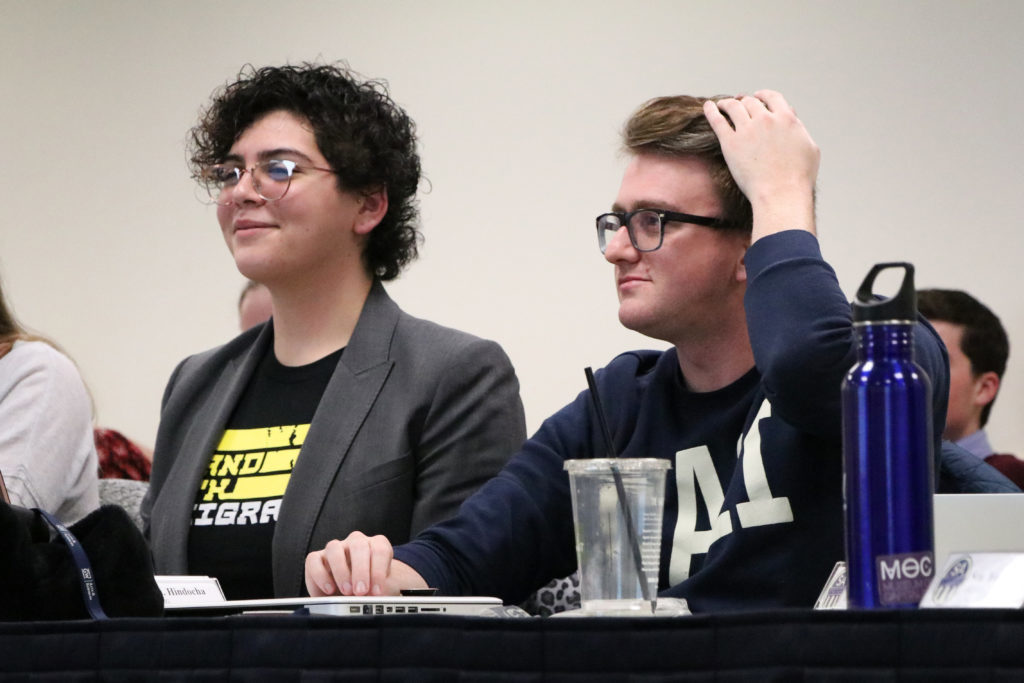The Student Association Senate passed a bill Monday requiring senators to hold weekly office hours to increase transparency and be more available to the student body.
The bill mandates senators hold at least one office hour a week for each constituency represented in the senate in a central campus location or through a virtual method, like Google Hangout. For schools with multiple senators representing a graduate or undergraduate constituency, at least one senator from that group would be required to hold meetings each week.
If a senator doesn’t hold the office hour, the bill would allow them to be kicked out of the senate.
The legislation also requires senators to attend two diversity and inclusion trainings each academic year.
Sen. Brady Forrest, G-at-Large, said he sponsored the bill to hold senators more accountable to their constituents and make the SA more transparent. He said the requirement to hold office hours is “desperately needed” because he has often seen senators say they will work on projects but not actually set aside time to complete the work.
“We represent thousands of people, and we should be accountable to them, and there should be a publicized office hour,” Forrest said. “Everyone else on this campus – office hours are kind of the norm, and in our market basket schools, office hours are the norm, so to not have one, when are people required to have time to actually do work or get things done?”
Sen. Jessica Martinez, CCAS-G, said she didn’t think the bill asked “anything crazy of senators” but offers an outlet for students to hold senators accountable and ensure that they’re accessible.
“I think one huge thing we’ve been talking about this whole year is the image of the Student Association and how students perceive us and how students find faith in us,” she said. “I think that this clearly outlines our responsibilities as senators and it allows students to have some faith in us that we’re going to try to hold each other accountable and that we’re going to try to be as available to students as we possibly can.”
But some senators opposed the mandate, saying that office hours are often unused and would add another requirement to senators’ already-busy schedules.
Sen. Imani Ross, U-at-Large, said office hours have “proven to be ineffective” because few students attend. She said if Sydney Nelson, the executive vice president of the SA, has only a few students attending her office hours, then SA senators should not expect to see higher turnout at their mettings.
“The office hour just becomes another thing that senators are forced to do where there’s no reasoning or actual student input if that’s something that they want,” she said.
An amendment to strike the office hour requirement from the bill failed to pass at the meeting.
The senate also voted Monday to amend to its student election reform bill.
In December, the senate passed a bill reforming SA election procedures and the Joint Election Committee, the body that oversees student body elections. The bill increased the number of JEC members from five to seven and included a new “commissioner” position who would be elected to head the committee by the student body.
The new bill makes the commissioner an appointed position instead of an elected one. The commissioner would be nominated by the JEC and then approved by the senate after the election season in March but before the end of the academic year.
Sen. Jan Yonan, CCAS-U, who sponsored the bill said after conversations with members of the current JEC, student leaders decided that electing a commissioner wouldn’t be efficient or beneficial to the functioning of the committee.
“We were worried that having the election commissioner elected and also not allowing any of the current JEC to run for that position because it would be within the elections that they are currently overseeing, that this would really sort of detract qualified candidates from becoming elections commissioner,” he said.
The senate also approved Logan Malik, the SA’s former director of sustainability policy, as the vice president for undergraduate student policy.
Senators also filled four vacant undergraduate seats and one graduate seat after some senators went abroad or resigned last semester. The body still must fill an empty graduate seat for the Graduate School of Education and Human Development.





